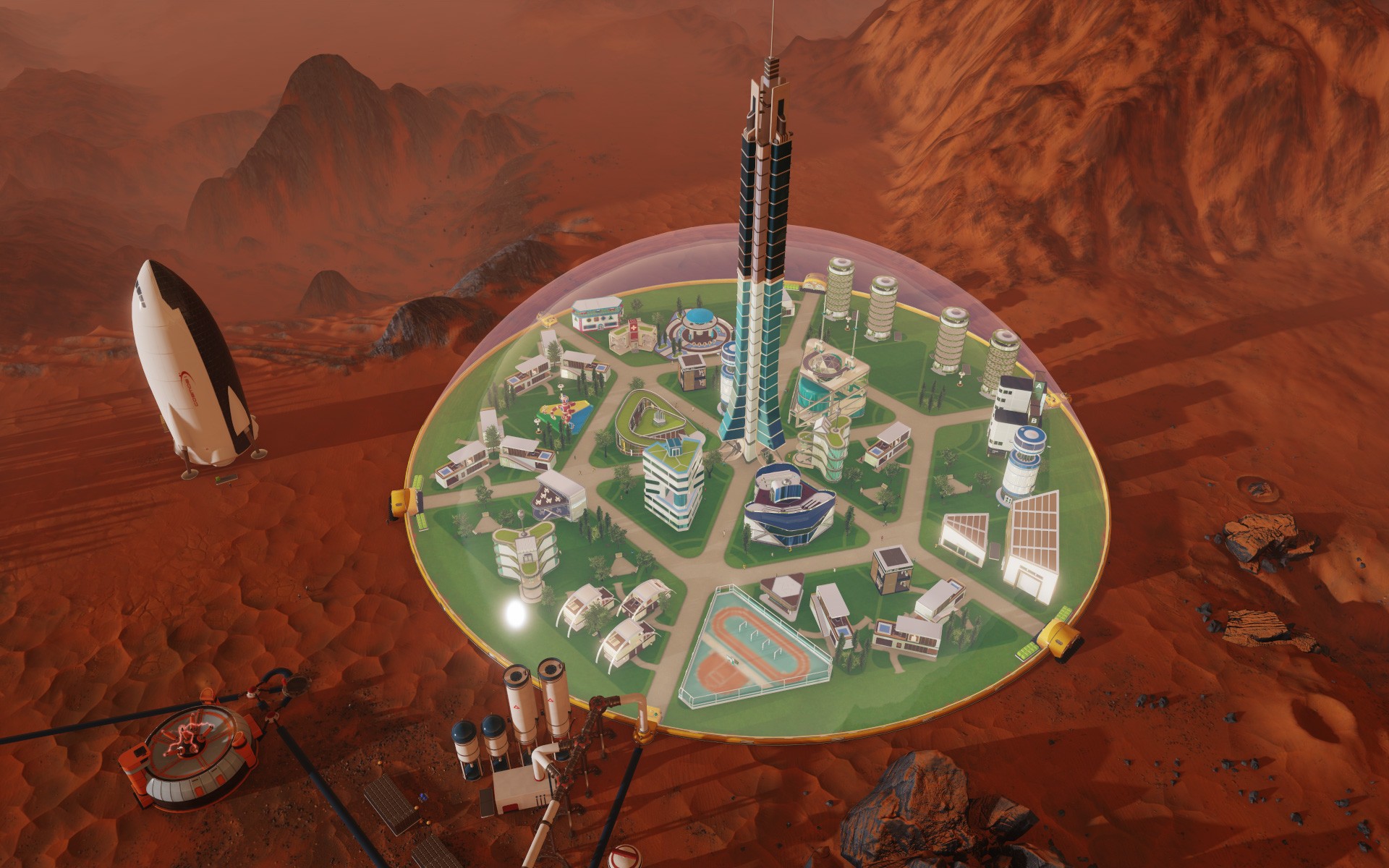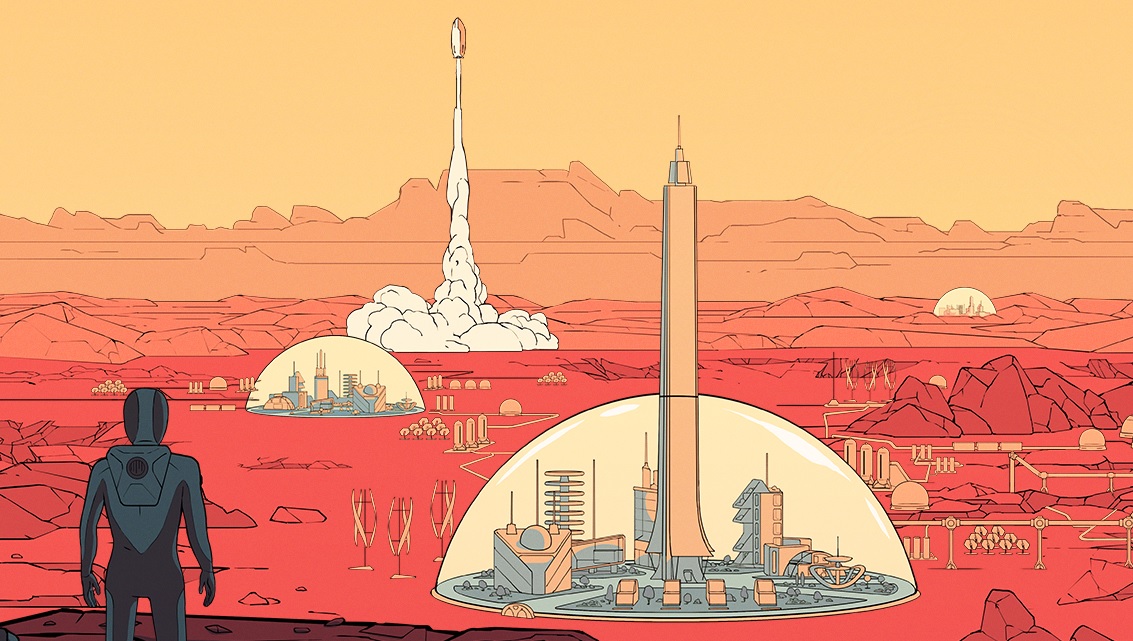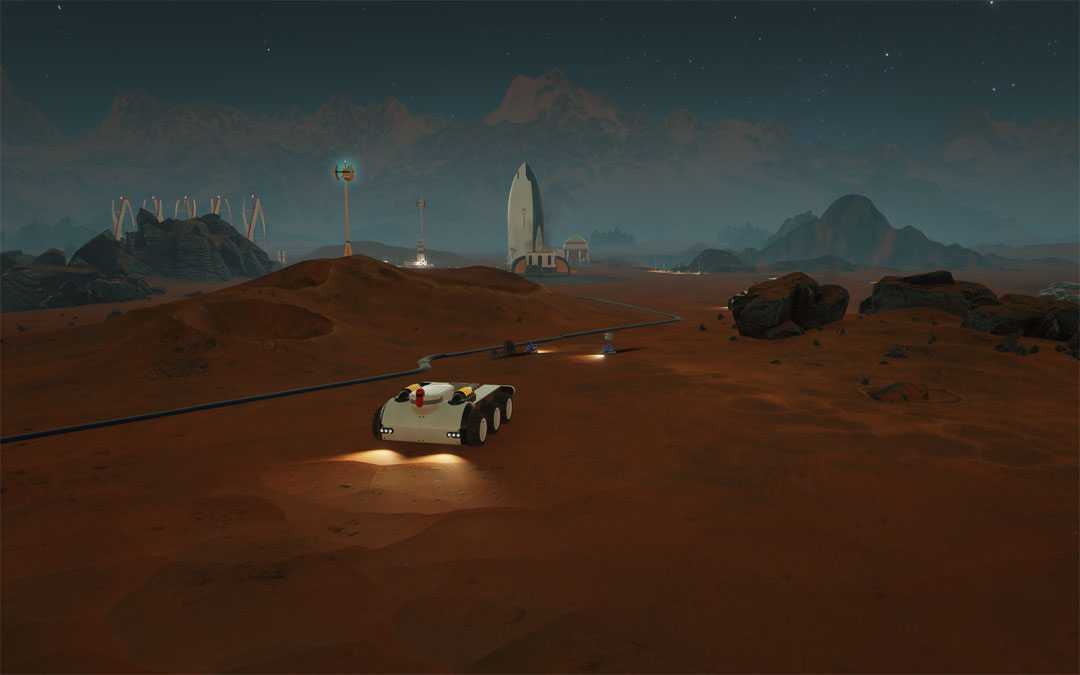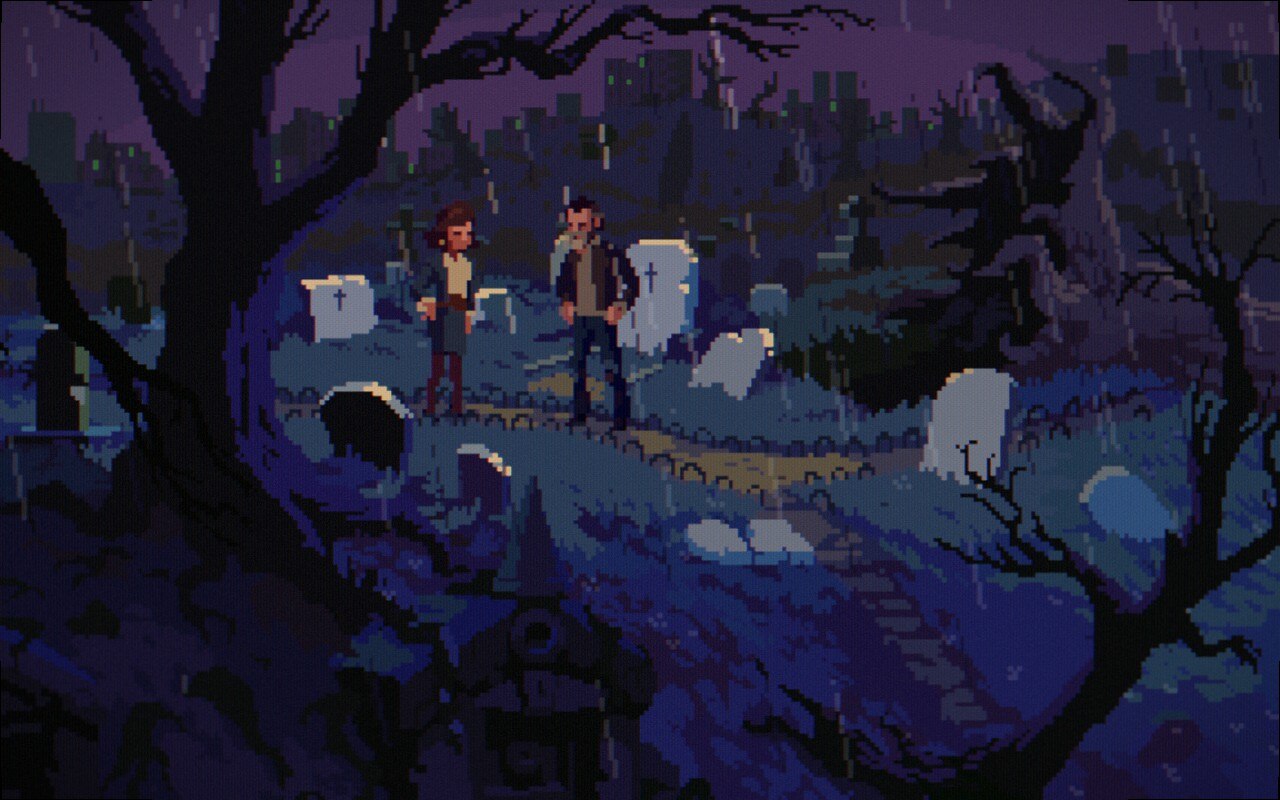Haemimont Games has just released their first video dev diary for Surviving Mars, their upcoming survival city-builder about colonizing the red planet. CEO Gabriel Dobrev took the time sit down with us for an exclusive interview about the challenges of setting up a comfy living space in a hostile environment, turning real science into fun gameplay, and what happens when everyone in your space dome suddenly wants to be just like the dumbest guy around.
PC Gamer: You mention in this video that you’ve incorporated a lot of actual science into Surviving Mars. What's your research process for that?
Gabriel Dobrev: So a lot of these issues have been tackled for a while now by different scientists. And all of this is summarized in a number of places. So what we had to do was cover, with the design team, all of the material in order to get acquainted with all of the current thinking about what’s going to happen. Because it’s not only about the science side of it. Sometimes the science is well-developed, sometimes not so well-developed. But the key here is, how do you turn that into actual, viable gameplay?
If I even look around, I just have a computer in front of me and a wireless [router]. And this is very complex machinery, but they look like a box. And as long as you plug the cables in, they just work. That’s a very nice magic we have, but you can’t have a good game with that. You know, you have to tell the player a little bit more about how they work and why they work. And you also have to, a little bit, kind of make ways for them to break so there actually is a game to play.

So where do you find that balance between accuracy and fun?
Take the example of the MOXIE ["Mars OXygen In situ resource utilization Experiment," an oxygen extraction system]—whatever the internal design of the MOXIE is, it’s just a box. And it just works. You plug in the power and as long as it has access to air, it just works. So we had to do stuff like, okay, there has to be certain cases where the MOXIE actually breaks and certain conditions where it won’t be able to work. So we, essentially, are finding ways to expose and explain a little bit of that technology and how it works to the player.
"It’s very important that it makes sense, and the problems players will have are some of the actual problems we will have when we actually go to Mars."
—Gabriel Dobrev, CEO
How do you feel about the way science is portrayed in games? Is there anything you guys are trying to do to change that?
Keep up to date with the most important stories and the best deals, as picked by the PC Gamer team.
We don’t really have an agenda in that sense. But from my end, I’ve always wanted to have more things to be explained and be real. Surviving Mars is a very good learning process, because we’ve really learned why you really have to sometimes simplify things. Because the actual thing that is going on is so complex, and the process of colonizing Mars is so complex and so many things can break in so many places, that we don’t really want to expose the player to all of that complexity. We somehow have to make it more manageable. But still, for us, it’s very important that it makes sense, and the problems players will have are some of the actual problems we will have when we actually go to Mars.
For example, the dust covering everything because there is a dust storm and a lot of machines stop working. Because they are clogged or just as a precautionary measure, they have to stop working otherwise they will just break. Also handing temperature, handling the radiation—in general, handling all the major hurdles people will have when they go to Mars. Being able to grow food on your own there is a big, big thing.
How did you decide on Mars colonization as the subject for your next game?
First idea was generally, outside of Earth. But then we quickly realized that … the type of things you will have to do to go to the surface of Venus or to the Moon will be very different because the conditions are so different. And the type of things you will have to produce on the surface versus the type of things you will have to bring in, also the general outlook of your structures, will be different. And since Mars is kind of the next thing that is very close on the horizon, we decided, okay, this is the one we will tackle. And then we actually realized that, by doing this, we will be able to tell people a little bit about what the actual problems will be so they can learn more. And I’m really looking forward to people playing the game and then saying, “Okay, I want to know more about this and what’s happening.”

What’s the longest, internally, that you’ve seen someone keep a colony going?
Oh, very long. We have games that are about 40 hours [of play time] on a single colony? And you pretty much have everything. You’ve got all the resources. You’ve researched everything you need. Really trying to do everything in the game. And even in that playthrough, it wasn’t all done. We tried to sort of break the game in a certain way to get the highest research possible. And this led to accumulating an enormous amount of money. The guy just had billions and billions. Because he was selling all of this research [output] back to Earth, and also selling various resources. But his colony was not big. Not even close to what you can get in terms of size. He was more focused on breaking that specific mechanic.
Then what's Surviving Mars' 'ending?'
We don’t have a stopping point and we are consciously avoiding providing any. Even in some games when you can continue the game [indefinitely], when you see that screen that kind of says, “That’s all,” you feel like that’s all. Because the game just told you. Five minutes before you were okay [to keep playing], and now it’s kind of like, well, it’s over. And we don’t want to do that. So really, it’s up to you to decide. We have these milestones you can achieve and some of them are not easy, at all. And you’re definitely not going to achieve them all in a single playthrough. Or maybe you will. That could be a goal—to get all of the milestones done in a single playthrough. But essentially it’s up to you to really decide how much is enough.
And you can play to really just establish a working colony. You know, that’s a very quick thing to do in a few hours. Your colony is set up. [Your colonists] are happy with their lives. You’re producing all of the resources you need for the colony. And you have this small, stable society. And then there are the mysteries [ed note: optional quest chains that introduce some more outlandish sci-fi elements to be uncovered], so you can play through the entire mystery. And typically, your research opportunities last way longer than that. So you can try to research everything you can get your hands on, which is going to take quite a while. So you really have to decide when it’s enough for you.
I’m curious about what your general inspiration was for the game's aesthetics.
The first inspirations were The Jetsons and Futurama. We love that, and we kind of wanted to do that, but we never had the opportunity. We wanted, even way before this project, to somehow incorporate that naive style and very clean things. Very functional at the same time. So that retro-futuristic style was really something we wanted to do and we decided maybe it was going to be a match.
And the second inspiration came from what we think and consider necessary on the surface of Mars. So if you have machinery that looks like the Curiosity rover, and you have to go there and live there—that rover looks like it’s going to fall apart any moment now. It’s a wonder that it hasn’t fallen apart yet. And if you have to go and live in that environment, you definitely don’t want the things around you to look like that. You have to feel very, very safe. And that’s why we wanted to have these very clean aesthetics. We think that is really necessary if you want to have people living there and feeling comfortable over long periods of time and bringing more people than a few highly-trained scientists. You need to have people going there because it’s really a better place to live.
Overall, are you wanting Surviving Mars to feel more lighthearted, along the lines of a Tropico? Or will it be closer to some of the other things you’ve done that are a bit darker?
There is danger, and there will be a lot of dangerous things. But this is not our focus. It’s not about the drama of the dangers you face on Mars. Our focus is more on the challenge of getting to Mars and settling it. So we didn’t want to make it a big problem, what’s going to happen if all of the sudden you lose power? So we wanted to sort of get away from that dark future kind of environment. It’s more about keeping it optimistic and positive.
You say that, but you’ve also mentioned several times that it’s going to be a difficult game. It’s going to punish you for playing poorly, like a survival game. What’s been your tactic for balancing that optimistic and accessible atmosphere with the difficulty?
We have a number of things that can change your difficulty. One of them is picking a mission sponsor. Some sponsors just give you a lot of things. Sometimes even, you can have all of the research done for you on Earth. So you might never even set up any research on Mars. It will go slowly, but you can completely rely on that. You can have a lot of food brought in, so you don’t have to set up these separate systems to take care of that. And with some sponsors it’s a lot tighter.
It also depends on where you land on Mars. If you land on a spot where there are not that many dangers and there are a lot of resources around, naturally, it will be a lot easier to set up the colony. If you need something, you can just move over a few meters and there it is. But if you land on a much harder position, you can see your water reserves depleting and you have no idea where you will get your water. So you have to scan more of the surface so you can maybe find frozen water underneath the surface. Or you can try to bring in some machinery that produces water, but that’s expensive in a different way. So you see this wall coming that you have to find a way around.
Planning against those issues is very interesting. So the difficulty varies greatly, and we absolutely recommend playing with the easier sponsors first just to get familiar with the mechanics and how everything works out, then try with the more difficult ones.

So who’s the sponsor that’s like, the really, really hardcore players pick it just to show off how good they are at the game?
I am not sure, honestly, about dropping names [right now]. But we have surprises there, let’s say. We have difficult ones that are really, really limited in what they can offer you.
There might be like, Joe’s Mars Colony Supplies and Sandwich Shack?
[laughs] When you see it, it will be very self-explanatory.
I hate to ask this before the game is even out, but—we’ve seen with most of the recent Paradox games, from the Development Studio stuff like Europa Universalis IV down to, you know, Cities: Skylines, this sort of ever-expanding with DLC strategy. Have you guys thought about if you want to go that route?
For the moment, we are absolutely focused on cleaning up the game, polishing everything and getting the performance and everything right. So we don’t have any particular decisions about what we are going to release. I would certainly hope so. Because my feeling is—the game is pretty long when you start to play, and there are so many systems interplaying with each other. And there is such space to explore, design-wise, in terms of different ways to tackle this problem. Different solutions, different approaches. We really don’t feel that we have exhausted the space [with the core game], so to speak. So I really am hoping that we have the chance to explore that fully.

Before you go, what's the most memorable thing you've had happen while playing the game so far?
I can tell you about something that is not a hallmark of what the game is, but is very interesting and crazy. All the citizens on Mars are different, and they have different traits. They are all unique in their own way. And we had for the first time in the office, a couple days ago, a 'Guru Idiot.' And the idiots, they just sometimes break stuff, you know. They just walk around and go to work, and everything explodes, and they’re just like, “Oh, whatever.” And of course, you may decide that you don’t want to recruit any [idiots] to come to Mars. But you can also try to invite them, and that’s also fine. You know, even if something breaks occasionally, you can fix that. But the guru is this rare trait of a person that sort of teaches everybody around him to be more like him. And in this case, they’re all becoming idiots. And in a colony full of idiots, everything just breaks because there are so many.
The first inspirations were The Jetsons and Futurama.
This almost reminds me of American daytime television. The implications of the guru idiot.
[laughs] You know, if it’s maybe one or two, it’s fine. But if it’s a whole bubble of them, then everything is literally falling apart. It’s a crazy, crazy thing. So we had a big laugh when that happened. Just anticipating what was going to happen when we saw that. And we’re still discovering these combinations of these different traits ourselves. And we’re looking forward to the first time that we encounter this or that combination that we’ve discussed, this will be very interesting when it happens.
Oh, I did have one more thing I have to ask as a metal fan. You did the Motörhead DLC for Victor Vran. Is there any chance we will ever be able to send Motörhead to Mars?
[laughs] I don’t know. This is such a licensing nightmare. We do have a very good relationship with the Motörhead guys. Unfortunately with Lemmy [Kilmister, late frontman] passing away, we can’t really ask—we can ask [guitarist] Phil Campbell and see if he wants to be on Mars. And that would be a very interesting sort of mix-and-match. But now that you mention it, I think Victor Vran can probably find a way to Mars. That’s a very interesting thing.
Yeah, especially if he became a guru. I could see some interesting implications with that.
Thanks to Gabriel for taking the time to talk to us! Surviving Mars is set to release in 2018, but Paradox is taking signups on survivingmars.com now.
Len Hafer is a freelancer and lifelong PC gamer with a specialty in strategy, RPGs, horror, and survival games. A chance encounter with Warcraft 2: Tides of Darkness changed her life forever. Today, her favorites include the grand strategy games from Paradox Interactive like Crusader Kings and Europa Universalis, and thought-provoking, story-rich RPGs like Persona 5 and Disco Elysium. She also loves history, hiking in the mountains of Colorado, and heavy metal music.

